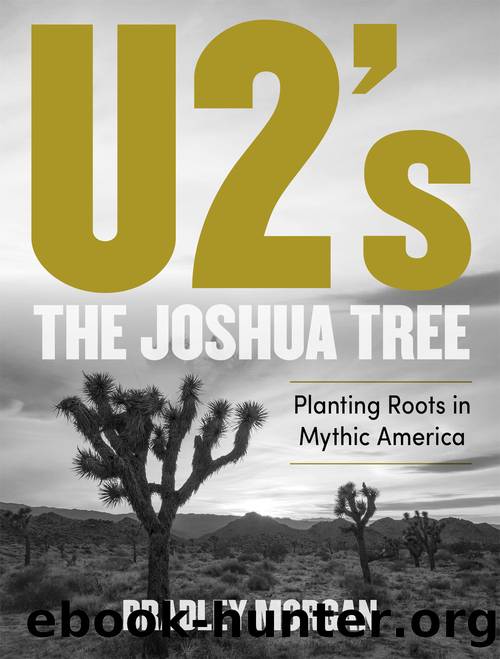U2's the Joshua Tree by Bradley Morgan

Author:Bradley Morgan
Language: eng
Format: epub
Publisher: Backbeat
Published: 2021-09-10T00:00:00+00:00
CHAPTER TEN
Sweet the Sin
ALTHOUGH THE JOSHUA TREE IS AN ALBUM THAT REFLECTS U2âS EXIStential journey through America and discovering its inherent dichotomy, part of that journey included the band understanding their own Irishness in relation, and not every song on the album directly addresses a distinctly American issue. Adding homegrown emotional depth to the album, the band drew parallels between struggles they witnessed in America with what they had witnessed, and could potentially have experienced, in Ireland. During the journey of recording The Joshua Tree, U2 would come to find that temptation, often an obstacle or catalyst in the search of salvation, was a force that dominated all of humanity.
Drug abuse was a topic U2 had dealt with before on their previous album The Unforgettable Fire from 1984. âWire,â the third track on the album, was a song about Bono commenting on Dublinâs growing heroin epidemic in the early 1980s, which included him knowing some friends who used it and were addicted, with the songâs lyrics expressing ambivalence to it. In âWire,â there is an acerbic tone as Bono sings lines saying the subject in the songâs narrative feels like today is a nice day to throw his or her life away. Despite a perceived air of judgment, Bono recognized that he too, having grown up and still living in Dublin at the time, could have shared the same fate as others he knew and suggested that he perhaps suffers from an addictive personality himself. [Hot Press, âI Still Havenât Foundâ]
The other song on The Unforgettable Fire to address drug abuse, and the one performed during Live Aid that catapulted U2 to success, was âBad.â Originating from a tune improvised by the Edge, âBadâ is a considerably more compassionate track than âWireâ as Bono continues to struggle with an internal conflict regarding drug abuse and his own temptation. In Into the Heart, Niall Stokes says, âThere is a sense throughout âBadâ that [Bono] doesnât know what he wants to say, and that he doesnât know what heâs saying either. But, in a way, he says it eloquently.â [Stokes, Into the Heart, 58] That eloquence Bono puts into the track comes from a realization that he could fall easily to temptation just like anyone else can. He even sings in the song that he would let go and surrender if he could.
As U2 were becoming more successful as a band, their opportunities for the excess of a rock-and-roll lifestyle grew. With songs like âWireâ and âBad,â Bono could have potentially been reacting to the darker allures of that lifestyle, but they also came from a deeply personal place, physically and emotionally, that U2 grew up with.
In his book The World and U2: One Bandâs Remaking of Global Activism, Alan McPherson discusses the level of poverty Ireland faced and U2âs exposure to it at an early age. McPherson describes Bonoâs and the Edgeâs upbringing as being middle-class, compared to Larryâs and Adamâs families being working class. [McPherson, The World and U2, 4]
Download
This site does not store any files on its server. We only index and link to content provided by other sites. Please contact the content providers to delete copyright contents if any and email us, we'll remove relevant links or contents immediately.
Kathy Andrews Collection by Kathy Andrews(11832)
The remains of the day by Kazuo Ishiguro(8999)
Spare by Prince Harry The Duke of Sussex(5197)
Paper Towns by Green John(5191)
The Body: A Guide for Occupants by Bill Bryson(5097)
Industrial Automation from Scratch: A hands-on guide to using sensors, actuators, PLCs, HMIs, and SCADA to automate industrial processes by Olushola Akande(5061)
Machine Learning at Scale with H2O by Gregory Keys | David Whiting(4313)
Be in a Treehouse by Pete Nelson(4051)
Never by Ken Follett(3957)
Harry Potter and the Goblet Of Fire by J.K. Rowling(3858)
Goodbye Paradise(3810)
The Remains of the Day by Kazuo Ishiguro(3413)
Into Thin Air by Jon Krakauer(3399)
Fairy Tale by Stephen King(3399)
The Cellar by Natasha Preston(3344)
The Genius of Japanese Carpentry by Azby Brown(3309)
120 Days of Sodom by Marquis de Sade(3275)
Reminders of Him: A Novel by Colleen Hoover(3121)
Drawing Shortcuts: Developing Quick Drawing Skills Using Today's Technology by Leggitt Jim(3081)
